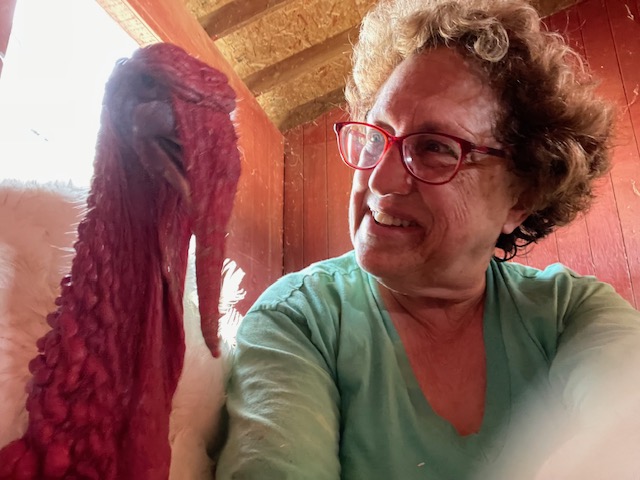main content On Thanksgiving, I think about my “turkey boyfriends”
A Thanksgiving reflection by Professor Joyce Tischler

Pistachio, one of Professor Tischler’s “turkey boyfriends” from Animal Place in Grass Valley, California.
When my daughter, Margeve, was growing up, our family would visit Farm Sanctuary, then located in Orland, California, about a 3-hour drive from our home. There, we could walk, run and play on hundreds of acres of beautiful open farmland, and hobnob with the rescued farmed animals. It was always a lot of fun.
With each visit, I would focus on a group of animals and spend time getting to know them. Much of what I’ve learned about farmed animals has come from just hanging out and watching them be themselves. I’d visited with the pigs and the cows, the sheep and the goats, the donkeys and the rabbits, and so, on this occasion, I decided to park myself at the entrance to the turkey barn and see what happened. I had never spent quality time with turkeys before, so I did not know what was in store, but I was eager to find out.
No sooner had I sat down, when a large male or “tom” turkey walked over and started to slowly circle around me. Because I was sitting on the ground, our heads were at about the same height. A turkey’s eyes are not on the front of their face, like ours, but on each side of their head. If I reached out my hand, the turkey would back away, but if I sat very still, he would look at me intently, with that one eye, as he slowly walked around me. By the third rotation, he was within a few inches of my face. I had no idea what he was thinking, but I was charmed by his curiosity. He left, and another male turkey took his place, doing the same circling and keeping his eye fastened to me. And, then, another. My daughter, who was 7 years old at the time, watched this and teased me, saying, “Mom; you have turkey boyfriends!”
I’m embarrassed to admit that prior to that encounter, I believed the myth that turkeys are stupid. I was so very wrong. My turkey boyfriends taught me that they are friendly, curious about the world around them, and endearing in their efforts to figure out who this strange little woman was. They were also kind, never acting aggressively towards this intruder who had unexpectedly plopped herself into their space.
Margeve is now grown up, but I continue to seek out opportunities to spend time with the rescued farmed animals at sanctuaries. Every time I do, it provides a fresh reminder about why I’m so passionate about advancing legal protections for farmed animals.

Now-a-days, when I visit farmed animals, I often head straight to the turkeys, and sit with them quietly, remembering my turkey boyfriends, and making new turkey friends who teach me, once again, how bright, engaging, sweet and delightful they are.

The Center for Animal Law Studies (CALS) was founded in 2008 with a mission to educate the next generation of animal law advocates and advance animal protection through the law. With vision and bold risk-taking, CALS has since developed into a world-renowned animal law epicenter. CALS’ Alumni-in-Action from over 25 countries are making a difference for animals around the world. CALS is a nonprofit organization funded through donations and grants.
Center for Animal Law Studies is located in Wood Hall on the Law Campus.
MSC: 51
email cals@lclark.edu
voice 503-768-6960
Center for Animal Law Studies
Lewis & Clark Law School
10101 S. Terwilliger Boulevard MSC 51
Portland OR 97219
More Stories

Protecting Farmed Animals in Memory of Thomas Bloom Raskin
Megan Rosen, LLM Candidate, Named Inaugural Recipient of the Thomas Bloom Raskin Animal Protection Scholarship

Manure Biogas is All Hat and No Cattle
Miranda Herreid, a JD student in the Farmed Animal Protection Project, breaks down why manure biogas is not the solution and will further entrench factory farming.

Moo Deng Highlights the Plight of Pygmy Hippos
Behind the viral memes lies the opportunity for an important conversation about wild animal protection

ABA House Passes Resolution to Protect Domestic Violence Survivors and their Pets
Megan Senatori, Associate Director of the Center for Animal Law Studies, helped to lead the advocacy effort and was a co-author of the resolution and report, with support from two Lewis & Clark JD students.
